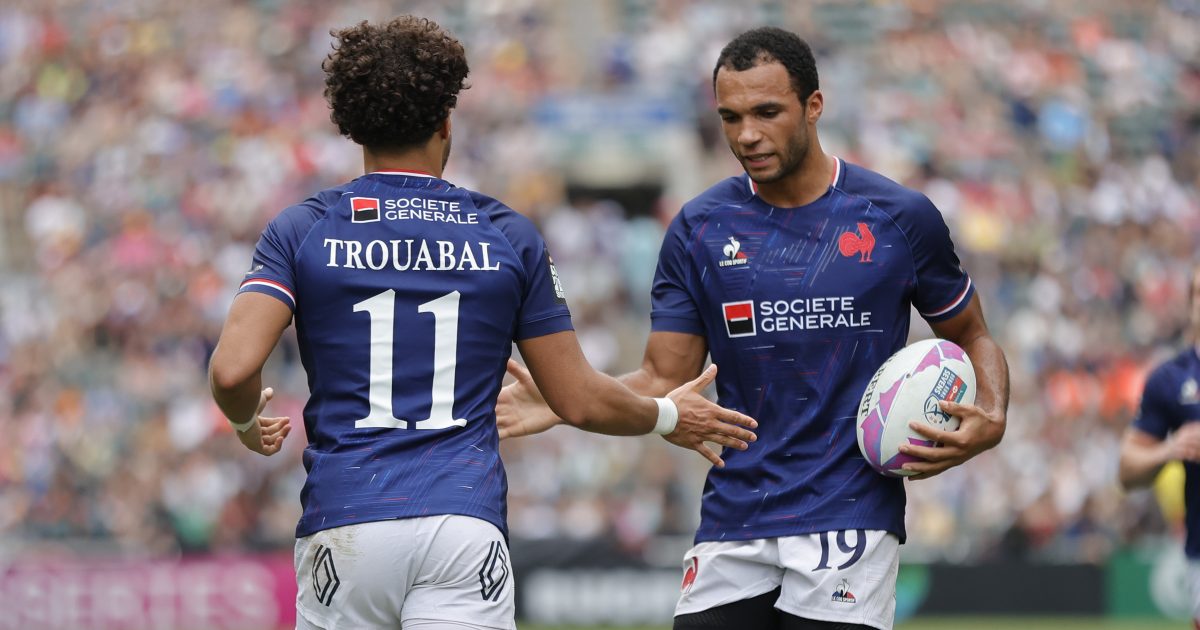La France s'incline en finale du tournoi masculin de Hongkong

La Nouvelle-Zélande a remporté une finale tendue 10-7 contre la France pour défendre son titre du Cathay/HSBC Hongkong Sevens et remporter sa première Cup de la saison.
La première période restait bloquée sur un score de 0-0, mais un essai de Scott Curry a permis de débloquer la situation en début de seconde période. Un deuxième essai de Cody Vai après un mauvais renvoi français a permis à la Nouvelle-Zélande de remporter la médaille d’or du tournoi, tout comme les femmes l’avaient fait dans le match précédent contre les Etats-Unis.
Dans la finale de bronze, un doublé d’Hugo Lennox en première période a permis à l’Irlande de monter sur le podium en battant l’Australie 14 à 5.
Ces trois jours de rugby à Hongkong, le dernier au Hongkong Stadium, s’achèvent avec une seule place à confirmer pour la grande finale de Madrid, les États-Unis, la Grande-Bretagne et l’Espagne étant toujours en lice.
La France termine avec l’argent
Dans une première période tendue et nerveuse, les deux équipes se neutralisaient en multipliant les fautes directes. La meilleure occasion était pour la Nouvelle-Zélande, mais le Français Aaron Grandidier se reprenait bien pour couvrir le plaquage et étouffer l’occasion pour les champions en titre. La mi-temps était sifflée sur un score nul et vierge.
La deuxième mi-temps commençait avec la même tension, mais la France concédait deux pénalités rapides et la Nouvelle-Zélande finissait par ouvrir le score par l’intermédiaire d’un Scott Curry boitillant qui faisait circuler le ballon de droite à gauche.
Les Néo-Zélandais n’ont pas eu à attendre longtemps pour marquer le deuxième essai, une mauvaise transmission de Stephen Parez-Edo Martin ayant été récupérée par les All Blacks Sevens et Cody Vai trouvant l’espace nécessaire pour accroître l’avance des Néo-Zélandais.
La France obtenait la possession du ballon au fur et à mesure que le temps passait, mais lorsqu’elle a commis un en-avant à moins d’une minute de la fin, on a bien cru que la Nouvelle-Zélande l’avait déjà emporté.
Pourtant, la France a tenté le tout pour le tout dans la dernière minute, en récupérant le ballon à quelques instants de la fin. Varian Pasquet s’élançait pour marquer, mais il manquait quelques secondes pour aller encore plus loin. La France s’inclinat devant la Nouvelle-Zélande.
Les demi-finales : La France trop forte pour l’Irlande, la Nouvelle-Zélande bat l’Australie
La France a réalisé une belle performance en battant l’Irlande 26 à 10 et en se qualifiant pour sa deuxième finale de suite.
Andy Timo est à l’origine de l’ouverture du score français, son jeu de jambes impressionnant étant suivi d’une passe parfaite pour Varian Pasquet qui ouvrait le score.
L’Irlande revenait peu après, créant finalement un espace sur la droite pour Zac Ward qui centrait, mais à partir de là, les joueurs en vert ne parvenaient pas à trouver leur rythme, tout comme la France. Stephen Parez-Edo Martin ajoutait un deuxième essai avant la mi-temps et deux autres en succession rapide après la pause par Antoine Zeghdar et Joachim Trouabal.
La France tenait bon en défense jusqu’à ce que Terry Kennedy ne marque le dernier essai de la rencontre, envoyant l’Irlande en finale de bronze.
Un essai côté fermé suffisait à Dylan Collier pour ouvrir le score pour la Nouvelle-Zélande contre l’Australie lors de la deuxième demi-finale, mais Maurice Longbottom faisait marcher ses appuis pour battre son adversaire et transformait son propre essai pour reprendre l’avantage.
La Nouvelle-Zélande bénéficiait d’une autre offensive avant la pause, et alors que James Turner repoussait brillamment Andrew Knewstubb à quelques centimètres de la ligne, une mêlée au milieu du terrain donnait aux All Blacks Sevens l’occasion de prendre l’avantage grâce à Tepaea Cook Savage qui feintait et déposait.
La Nouvelle-Zélande prenait le contrôle du match en deuxième période, Cody Vai et Tone Ng Shiu marquant tous les deux. Les champions en titre se qualifièrent pour la finale, en ciblant leur première médaille d’or de la saison.
Finale de bronze : L’Irlande remporte le bronze grâce à un doublé de Lennox
Le doublé d’Hugo Lennox en autant de minutes a permis à l’Irlande de mener 14-0 à la pause. Son deuxième essai fut le fruit d’une impressionnante action individuelle, d’un débordement et d’une recherche d’espace dans le champ arrière, avant de tromper Turner et de marquer un essai.
En deuxième mi-temps, l’Australie a eu du mal à s’imposer dans le match et les fautes directes lui ont coûté cher. Henry Palmer a réussi à marquer un essai alors que le temps s’écoulait, mais la transformation manquée ne laissait aucune chance à l’Australie de l’emporter.
LE CLASSEMENT DU CATHAY/HSBC HONGKONG SEVENS MASCULIN :
- Nouvelle-Zélande
- France
- Irlande
- Australie
- Fidji
- Afrique du Sud
- Etats-Unis
- Espagne
- Argentine
- Samoa
- Grande-Bretagne
- Canada


